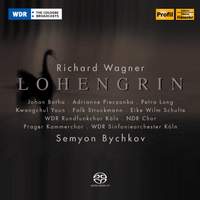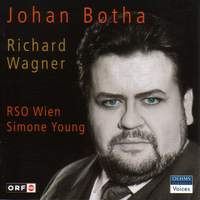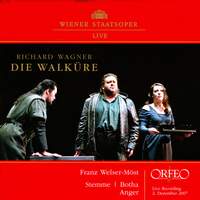Obituary,
Johan Botha (1965-2016)
 The South African dramatic tenor Johan Botha, particularly acclaimed in some of Wagner, Strauss and Verdi’s most demanding roles, has died aged just 51. Though he had been ill for some time and recently took a brief sabbatical from performing, he was singing wonderfully just three weeks ago in a fundraising gala for cancer research in Cape Town, and had a full diary of international engagements up until late 2017 (including the title-role in Lohengrin in Berlin, Radamès and Calaf in Vienna, and Otello in Dresden).
The South African dramatic tenor Johan Botha, particularly acclaimed in some of Wagner, Strauss and Verdi’s most demanding roles, has died aged just 51. Though he had been ill for some time and recently took a brief sabbatical from performing, he was singing wonderfully just three weeks ago in a fundraising gala for cancer research in Cape Town, and had a full diary of international engagements up until late 2017 (including the title-role in Lohengrin in Berlin, Radamès and Calaf in Vienna, and Otello in Dresden).
Born in Rustenberg in 1965 and educated in Pretoria, Botha initially trained as a bass-baritone but made his professional debut in his mid-twenties as Max in Weber’s Der Freischütz in Roodenport, relocating to Europe shortly afterwards. Early breakthroughs at major houses (including the Paris Opera, Wiener Staatsoper, Covent Garden, and the Metropolitan Opera) followed, first in middle-weight Puccini roles such as Cavaradossi (Tosca), Rodolfo (La bohème) and Pinkerton (Madama Butterfly), but by the late 1990s he was taking on the big heroic roles that would mark him out as one of the most in-demand singers of his generation – Wagner’s Walther von Stolzing (Die Meistersinger), Siegmund (Die Walküre), Tannhäuser and Lohengrin, Strauss’s Bacchus (Ariadne auf Naxos), Aegisth (Elektra) and Emperor (Die Frau ohne Schatten), and Verdi’s Radamès (Aida) and Otello.
In powerhouse repertoire that’s not necessarily always associated with ‘beautiful singing’, Botha’s unusual combination of strength and sweetness was a marvel to hear: in roles like Walther von Stolzing and Lohengrin (often described as Wagner’s most Italianate score), his bright, unforced tone and natural sense of line emphasised the music’s bel canto pedigree like few other singers around today. I was lucky enough to experience him live twice (both times at Covent Garden, under Semyon Bychkov), first in the title-role of Elijah Moshinsky’s Lohengrin in 2009 and then two years ago as The Emperor in Claus Guth’s production of Die Frau ohne Schatten (which turned out to be his final appearance at the House); on both occasions he sang tirelessly and with unflagging beauty of tone, making these two incredibly taxing roles sound effortless yet never less than thrilling. In the big dramatic roles which even the world’s top opera-houses sometimes struggle to cast, Botha could always be relied upon not just to carry over a huge orchestra for four or five hours but to sound every bit as fresh at the end of the night as he was at the beginning; his early death is a huge loss indeed to the opera world, and his long-standing admirers at Presto send our sympathies to the colleagues, friends and family he leaves behind.
Johan Botha - some key recordings
Wagner: Lohengrin
Johan Botha (Lohengrin), Adrianne Pieczonka (Elsa), Falk Struckmann (Telramund), Petra Lang (Ortrud), Kwangchul Youn (King Heinrich), Eike Wilm Schulte (Herald); WDR Sinfonieorchester Köln, Semyon Bychkov
"Johan Botha's clear, bright tone and unforced power embody the title role splendidly." (BBC Music Magazine)
Available Formats: MP3, FLAC
Scenes and arias from Die Meistersinger von Nürnberg, Lohengrin, Parsifal, Der fliegende Holländer and Die Walküre.
Available Formats: MP3, FLAC
Wagner: Die Walküre: Act 1
Nina Stemme (Sieglinde), Johan Botha (Siegmund) & Ain Anger (Hunding); Orchester der Wiener Staatsoper, Franz Welser-Möst
"Botha’s bel canto-ish way with the line delivers a reading that remains distinctive, especially in the cleanness of its attack." (MusicWebInternational)
Available Formats: CD, MP3, FLAC





